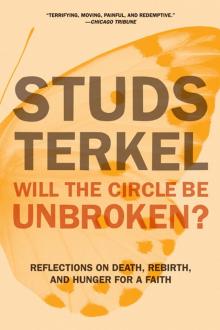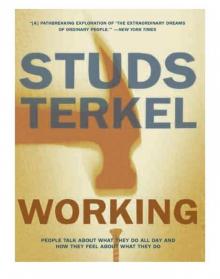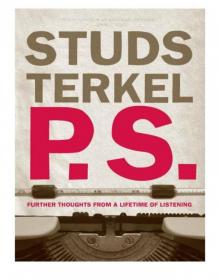- Home
- Studs Terkel
P.S. Page 2
P.S. Read online
Page 2
I ran around the studio, singing out “Ma-a-arr-te-e-e-ennn of de Me-e-e-est.” Five times. By the time I reached the mike, I was Phidippides at the end of the marathon. I carried no torch, but I didn’t collapse. I was breathing rather laboriously, I must admit. The musicians honored me with a tusch. Even now, my heart leaps as I hear the violin bows tapping the music stands.
But Einstein had another leap of the imagination. “Take your shoes off.” I looked dumbly toward the control room. “Don’t you understand?” He was testy again. “You’re Polynesian. They don’t wear shoes.” Oh, I got it. “May I keep my socks on?” There was a touch of desperation to my voice. I wasn’t sure I had showered that morning; I was worried about athlete’s foot; and I was certainly athletic at that moment. I waited. So did the whole symphony orchestra. Came the order: “Bare feet. Polynesians don’t wear socks. We want to hear the slap-slap-slap of your feet on the deck.” To this day, I am confused. How could the slap-slap-slap of my feet be heard a hundred yards away from the microphone? Slowly, I took off my socks. It was okay; I had taken a shower that morning.
It’s better with your shoes off. I was saying that to myself, thinking of the Stanislavsky technique. A touch of realism couldn’t hurt. It’s better with your shoes off. I thought of Beatrice Lillie, too, as she sang “I’m a geisha girl.” Her refrain was: “It’s better with your shoes off.” Thus reflecting, it helped. Once more, I sang out as I ran, a child of nature. When again I reached the mike, I was expecting a standing ovation from the orchestra. Nothing. A fine thing. They stand up for Solti, for Gilels, for Horowitz, for Piatigorsky. Was my performance any less virtuoso? Oh, well.
Polynesians. Levantines. Mediterraneans. Smugglers, assassins, children of nature. Glory moments. But none of these experiences matches the perverse delight of playing the American gangster. Even now, as in a mist, I hear my voice, “Get in dere, you guys.” I am Bogey, Cagney, Little Caesar. But it’s small consolation. I am not Clark Gable. Though that silk dressing gown has long since been taken away by the sanitation man, I think of Norma Shearer. And how I missed her something terrible. Oh, well. I did scare the daylights out of Ma Perkins.
DREAMLAND, 1977
IT IS NIGHTTIME. I am standing outside Dreamland. I am waiting for my brother. It is a ballroom on the West Side of Chicago. Here, black jazz bands play: Lottie Hightower and her men, one night; Charlie Cooke and his friends, another. I am impatiently shuffling my feet, though I do like the sounds I hear wafting through the open windows.
It is not to be confused with the Dreamland Cafe. That’s on the city’s South Side. Joe Oliver, up from New Orleans, played there a few years ago. He has since moved to Lincoln Gardens, where Johnny Dodds, his brother Baby, and a feisty little woman of a piano player, Lil Hardin, have joined him. His young disciple, Louis Armstrong, has been outblowing Joe and has just been called out East by Fletcher Henderson. A girl who picked up my brother took him to this place a few months ago. He said it was really something.
Here at the ballroom young white men and young women come to dance rather than to listen. Preferably on a dime. To sock. In short, to rub bellies together and, thus, excite one another. Always, toward the end of the night, comes the slow blues for which everybody is waiting.
My daddy looks at the clock
And the clock strikes out
Oh daddy, takes it out
Before it gets too late.
It is a place where young people who work all week as shoe dogs, secretaries, shipping clerks, and telephone operators—even nurses—come to dance, make dates, and, they hope, make love. My brother, a popular shoe dog at the Boston Store, usually does very well here. He is a natural-born dancer, tells funny stories, and has a way with the girls. He is seventeen.
It is 1924. I remember the year quite well. Fighting Bob La Follette ran for president. There were two other candidates, one of whom won. It made no difference which. It might have made a considerable difference had Bob won. That’s why he didn’t have a ghost of a chance. He did poll five million votes, and that was something—he being neither a Republican nor a Democrat. Nineteen twenty-four. And where have all the flowers gone?
Oh, I shocked and grievously disappointed Miss Henrietta Boone. She was my seventh-grade teacher at McLaren. I was her favorite. I sat in the front row, not merely because I was short. “Louis,” she purred (not Louis as in the Sun King; she pronounced it as in Lewis Stone, the Prisoner of Zenda), “are you for Calvin Coolidge or John W. Davis?” Innocently—or was I damnably perverse even then?—I piped, “Fightin’ Bob La Follette.” She was startled, poor dear. Her wig went slightly askew. I could see the terrible hurt in her eyes. Why have I upset such gentle hearts? Why couldn’t I have been my cute little button self and said the right thing: “Keep Cool with Coolidge”? It didn’t take much to make her day. I failed her.
In the autumn of 1960, at the reunion of the University of Chicago Law School, class of ’34, a straw vote was taken. Kennedy versus Nixon. The luncheon at the Loop Club wasn’t bad. The drinks were OK. A nice fat feeling of self-satisfaction all around. Those attending were lawyers who, from appearances, had done not too badly. Slight paunches and jowls closely shaven. The vote was something like: Nixon, 45; Kennedy, 41; Fighting Bob La Follette, 1. A few uncertain laughs. That was all. Several of my fellow alumni looked toward me. They smiled benignly. He’s a card, that one. I smiled, too. Charlie Chaplin.
I realize Bob has been dead many years. And yet it is a vote I was too young to cast in 1924. I did tell one luncheon companion, of raised eyebrows, that Bob La Follette, dead, had more blood to him than the two young make-out artists, who were more machine than human. His eyebrows shot up even higher. He turned to another to discuss real estate. I went for another drink. The bar was closed. Oh, the Midway, the Midway, where burning Veblen loved and sang . . .
Miss Boone did forgive me. On inaugural morning, the following March, she allowed me to listen on the school’s crystal set as President Coolidge took the oath of office on the front porch of his Vermont home. It was difficult to make out what he said. Perhaps it was because I had only one earphone; the other was being used by Dorothy, another favorite of Miss Boone. Perhaps he had nothing to say.
I could easily make out what Burton K. Wheeler said. During the previous fall, the Montana senator, Fighting Bob’s running mate, spoke at Ashland Auditorium. It was only two blocks from my mother’s rooming house. (Two years later, she sold it and leased a men’s hotel near the Loop.) And one block from Dreamland. My father arose from his sickbed and took me there. He liked Bob La Follette. My mother sniffed. She liked only sure winners. Wheeler was damning the malefactors of great wealth, loud and raspy and clear.
The vigor of his voice forty-five years later astonished me. I had visited his Washington law office in 1969. I was interested in his memories of the Great Depression. The rasp was still there, and the bite. He told of a trembling little senator from Missouri who considered resigning because “they’ve indicted the old man. He made me everything I am.” Tom Pendergast, political boss of Kansas City, was Harry’s boss, too. Wheeler had talked Truman out of it. I hadn’t the heart to ask whether he thought, in retrospect, he had done the right thing. Harry grew in the presidency, it is said. The impertinent question is hardly asked: Didn’t we, in a generation, diminish to his size? At eighty, Wheeler was booming out indignation. As I listened, transfixed, I was back at Ashland Auditorium. And only one block away from Dreamland.
In 1912, the year I was born, the Titanic sank. I have never, until now, attached any significance to it. Why is it that one of man’s most astounding achievements, the ship that will not sink, did in fact do just that while arrogantly ramming an iceberg? And why is it that I, who have made it a point never to drive a car, depend so much on technology, that is, the arrogant Uher (tape recorder). Will I, one day, encounter my own iceberg?
I am twelve years old. The dance is over. My brother will soon be coming out. I am hanging around for two reas
ons. My brother, if alone, might treat me to a chocolate malted at Liggett’s, and slip me one of those song sheets they pass out at Dreamland: “Yearning,” “I Wonder Who’s Kissing Her Now,” “Louise,” “All Alone.” I delight as he sings them to me in his light baritone, while I’m sipping a malted through a straw. On Friday evening, he’ll take me to the Palace, where the headliners, Van and Schenck, the Pennant Winning Team of Songland, will do wonders with these tunes. Nobody in the world can sing “All Alone” the way Joe Schenck does, in his high tenor, as he sits on the apron close to the audience.
As for the other reason: I am much taken with the music I hear. I had never heard such exciting sounds before. So this is jazz. I am hooked, now and forever.
I see him. He is not alone. There goes my chocolate malted. Oh, well. She’s a very pretty girl. Flashy. The others he’d come out with were pretty, too, each in her own fashion, but mousy. This one is quite mature, about twenty. He’s probably told her he’s twenty-one. He does that often, with girls he takes to one of the vacant rooms of Dixieland. (My mother’s rooming house had no such name, but I’ve since read Look Homeward, Angel.) My brother’s name is Ben.
I make it a point never to crab his act. He is, in fact, pleased to see me. We have an understanding. He calls on me to see that the coast is clear, that our mother is asleep, that the key to the vacant room is still on the hallway ring and not around her waist.
On several such occasions, after he and his companion have been at it, and she, suddenly guilt possessed, is anxious to get home at once, he gently raps on my door. He’s taking her home; she lives to hell and gone; you know the crazy schedule of streetcars at this hour; the bed is badly rumpled. If, in the meantime, our mother were to awaken before his return and make the rounds, as she often does, there would be hell to pay. Will I be a good kid and do the usual? I shut the pages of The Three Musketeers at the moment Planchet is spitting into the Seine.
The usual: hurried bare feet to the linen closet; clean sheets, clean pillowcases, a clean Turkish towel; and I’m on my way to Canaan Land. On reaching Canaan Land, it’s off with the old and on with the new. The vacant room is now free from signs of sin and ready for a paying guest, God-fearing or not.
A thought occurs to me. Had my luck been better, I might have become a first-rate pimp. Or a candidate for public office. Or even an adviser to presidents.
Ben and his friend reach the curb. Uh-oh. There are three guys on the corner. They approach. The girl appears alarmed and touches Ben’s arm. One calls out to her. She doesn’t move. Neither does Ben. The guy is really angry. He calls out again. She walks toward him, uncertainly, as though her high heels are giving her trouble. He slaps her hard. Her hand goes to her cheek. She whimpers. He grabs her by the arm and pulls her away. Ben moves toward them. The other two block his way. Each takes him by the arm. Ben resists as they force him toward an automobile parked nearby. Another guy sits at the wheel. I am against the wall, watching. Ben calls out to me.
I know the guy who slapped the girl. His name is Barney. He has been bragging a great deal about how tough he is. And how when it comes to women, he’s Rudolph Valentino. How he buys them Pink Ladies and pousse-cafés at the Blind Pig and then takes them to bed. Ben laughs at him. I know why. I have seen my brother, arm in arm, with any number of Barney’s girls, on his way to Dixieland. I have seen Barney, turning around and around, bewildered and furious. And alone. On these occasions, as I lean against the wall, I always cross my fingers. I’m afraid Barney may do something desperate.
Barney says he’s a member of the 42s; and Ben is gonna get it. Ben finds this brag and threat amusing. He tells me Barney is just a loudmouthed fake. Ben laughs; the 42s aren’t that desperate; they haven’t scraped the bottom of the barrel yet.
The 42s are junior members of the Syndicate. It’s a farm club. What the Toledo Mud Hens are to the New York Giants. They graduate, if they prove their worth, into the big league. I have no actuarial table at hand, but I’ve a hunch 42 alumni seldom reach the biblical age of three score and ten. Ben may not have been scared a moment ago, but he is now. So am I.
Two of my classmates at McLaren, Jimmy One and Jimmy Two, talk of one day achieving recognition in this society. They dream of the 42s as North Shore matrons dream of the social register. An older brother of one and a young uncle of the other, 42 alumni, are in the employ of Al Capone, one of our city’s most highly regarded citizens. The uncle, a few years later, was seen floating down the drainage canal. And no water wings. It was a strange place for him to have gone swimming. The waters were polluted even then.
My companions chatter incessantly. They confide in me all their Horatio Alger dreams: hard and fanciful work, with its concomitant, the rise to the top, Virtue rewarded.
I have no idea why they have chosen me as their confidant. Why not the parish priest? Perhaps it is because, during examinations, I shove my paper slightly to my right as I move in my seat slightly to my left. Jimmy One, who is seated behind me, moves slightly to his right and leans forward, brow furrowed. He is properly attentive as he glances downward. When his paper is completed, he shoves it slightly to his right, as he moves in his seat slightly to his left. Seated behind him is Jimmy Two.
Miss Henrietta Boone is delighted, though somewhat surprised, that Jimmy One and Jimmy Two do so well on these occasions. They pay so little attention during the rest of the semester. She prophesies: “In my crystal ball, I see three boys who will be successful young Americans, of whom we’ll all be proud.” She is Jeane Dixon.
How have her predictions come out? Jimmy One and Jimmy Two graduate from McLaren and the 42s into the greater society of the Syndicate. Jimmy One, according to Billboard ’s latest communiqué, is doing well in the jukebox industry. Occasionally, he makes the financial page of the metropolitan daily. He is the grandfather of seven, and the father-in-law of a young physicist.
Jimmy Two was doing magnificently in the field of fire and bomb insurance. His clients were, in the main, restaurants and taverns. One day, he met with an unfortunate accident. No one quite knows what happened. What is known is that Jimmy Two was found lying in some Chicago alley. The newspaper photograph, slightly fuzzy, shows him quite comfortable: He is staring up at the sky, though it is doubtful whether he sees much of its blue.
And I, the third of Miss Boone’s favorite boys, am doing what I’ve done most of my life: listening to what people tell me.
Aside from moments of perversity, which I find difficult to explain, I am agreeable to most people most of the time. I find in the silent-film comedian Raymond Griffith my alter ego. As a jewel thief, he fled to Mexico with his accomplice. When she felt the need to return to the United States and become respectable, he solicitously drove her back. When his two fiancées insisted on marrying him, he agreed and drove to Salt Lake City. Of course. When people talk to me of their lives, I offer the sympathetic ear. I nod understandingly as I watch the reel of tape revolving. It’s tougher with a cassette; there is nothing to watch.
There was a good deal to watch during the Kefauver investigation of organized crime. It was televised. One afternoon, especially, caught my attention. And my heart. Lou Farrell, an Omaha businessman, his hair a distinguished silver-gray, was on the stand. Senator Tobey, the righteous New Englander, was trying to give the witness a hard time. I paraphrase from memory:
“Your name is Luigi Fratto, is it not?” Not Louis, not Lou, nor, for that matter, Lewis. Luigi. What Cromwell was to the Irish, this bald Cotton Mather was to Mr. Fratto’s people. A sense of decorum was maintained by the witness. “Senator, you seen too many movies. My name is Lou Farrell.” It was offered with the rough grace and that proper note of impertinence of a Cassius Clay telling off inquisitors: “My name is Muhammad Ali.” The witness had indeed been Louis Fratto, my McKinley High School fellow alumnus. Was I perverse as, seated before the TV set, I glowed with pride?
Pride cometh before the Fall. I was to make this discovery one balmy spring night. It was a
reunion of McKinley graduates. In middle age, we gathered: politicians, lawyers, a doctor, a judge or two, a funeral director, a disc jockey. It was a West Side restaurant built in a rococo style. A huge fountain in the lobby below, with water flowing from out of the generous hands of a sculpted Roman goddess. Angels in stone, smiling beatifically at all the patrons from walls and ceiling. And here, amid all this salubriousness, I experienced mortification.
As a tribute was paid to teachers of the past, to honored alumni, among them Walt Disney, I was called upon. It wasn’t too long after Mr. Farrell’s television appearance. There was a good round of applause. I spoke of those more traditional schools, far less colorful, that boast of bankers, generals, senators, film stars, and philanthropists among their alumni. They are as nothing, I proclaimed. We of McKinley High have produced stars of the highest-rated show in the history of TV—the Kefauver Quiz. Where I had expected appreciative laughter, there was a dead silence.
The toastmaster, a judge well respected by Mayor Daley, whispered hoarsely, “For shame, Studs, for shame.” From the tables, I saw only smoke rings from Upmann Fancy Tales, being thoughtfully puffed. Oh God how I tried to recover, to win back the affection of my fellows. I talked of old glories, of our baseball teams that lost 15 to 2, of basketball teams that lost 95 to 23. I told fast and funny stories of the olden days: of Old Powles, a nineteenth-century remainder, of Mr. Brimblecom, of scraggly gray beard and mean, nasty, nasal putdowns of “Mediterraneans,” and of Mr. Potter, who favored his prize students with subscriptions to the Dearborn Independent, Henry Fords’s anti-Semitic journal. My words tumbled out, one on top of the other.
I heard one person laugh. It was more of a nervous giggle. As I sat down, two guests clapped their hands in a slow, measured beat. About three claps. At the table, a companion murmured softly, “Kid, you went over like a lead balloon.” And yet, in retrospect, it was no ethnic slur at all. I was right in expressing pride.

 Will the Circle Be Unbroken?
Will the Circle Be Unbroken? Hard Times
Hard Times Working
Working Touch and Go
Touch and Go P.S.
P.S. The Studs Terkel Reader_My American Century
The Studs Terkel Reader_My American Century